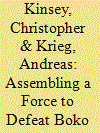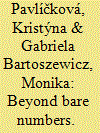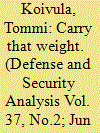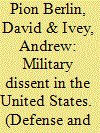|
|
|
Sort Order |
|
|
|
Items / Page
|
|
|
|
|
|
|
| Srl | Item |
| 1 |
ID:
178661


|
|
|
|
|
| Summary/Abstract |
In the context of an increased use of commercial soldiers in high-end conflict, this article investigates how the Nigerian government's reliance on the global market for force has helped its efforts to counter Boko Haram. The article shows, through a case study of Nigeria's counterinsurgency campaign against jihadist insurgents, that states in the developing world can augment their ability to provide effective public security by creating security assemblages. Moving beyond the normative debate about Private Military Companies (PMCs), this article highlights that public-private security arrangements can support the state in the developing world to live up to its role as a communal security provider. Nigeria's employment of the South African PMC Special Tasks, Training, Equipment and Protection Ltd. (STTEP), helped it build an effective public-commercial partnership, thus providing the Nigerian Armed Forces (NAF) with capacity, capability and norms that were essential in their counterinsurgency struggle.
|
|
|
|
|
|
|
|
|
|
|
|
|
|
|
|
| 2 |
ID:
178658


|
|
|
|
|
| Summary/Abstract |
This paper closely scrutinises NATO engagement, particularly the The Eastern Flank countries in the Middle East. Our main argument is that the quantitative approach to free riding is useful only when it comes to black-and-white policy choices and either-or policy decisions. Simultaneously, it fails when we are faced with more complex situations in which evaluations go beyond the very simple numerical markers, such as the 2% threshold of defence spending. By bringing together a unique regional focus (the European East and the Middle East), theoretical dilemmas (free-riding) and policy issues (NATO's multilateral framework of co-operation understood in terms of strategic interests and practical engagement), we are able to show that Romania is a subtle free rider, which cannot be verified by merely looking at numbers alone, but can be ascertained by a careful qualitative analysis which reveals a discrepancy between the country's strategic interests and its level of engagement.
|
|
|
|
|
|
|
|
|
|
|
|
|
|
|
|
| 3 |
ID:
178655


|
|
|
|
|
| Summary/Abstract |
This article proposes Stephen Jay Gould’s concepts of time’s arrow and time’s cycle as a conceptual tool to analyse NATO’s burden-sharing disputes. It argues that the controversies on burden-sharing in NATO can be assessed in terms of their cyclic or arrow kind nature, rendering some disputes more likely to recur than others and providing different kinds of starting points for their forecasting. The study identifies four cyclic categories in which burden-sharing has transformed into a political debate among NATO members during the post-Cold War era: geopolitical change related to Russia; periods of US foreign political retrenchment or renewal; the passivity or activism of European NATO members; and during NATO or allied out-of-area operations. Moreover, the study suggests an arrow kind of direction in burden-sharing disputes, indicating an expansion of disputes to cover comprehensive security, resilience, security co-operation and diplomacy, and to engulf also NATO partner countries.
|
|
|
|
|
|
|
|
|
|
|
|
|
|
|
|
| 4 |
ID:
178659


|
|
|
|
|
| Summary/Abstract |
The civil–military relations of the Trump Presidency became increasingly troubled. The President attempted not only to involve the military in partisan politics, but also in counter-protest operations in the face of nationwide demonstrations. Such operations increase the likelihood of human rights abuses by the military, which prides itself on professionalism and public approval. How can officers resist a commander-in-chief pulling them into partisan politics, particularly when this endangers military professionalism and quite possibly democracy itself? This article finds that U.S. military commanders might turn to their counterparts across Latin America for examples and lessons. Commanders in Chile, Ecuador, Colombia and Brazil have found innovative waves to resist unwise Presidential orders and potentially save lives in the process. Critically, we find that these instances of justifiable dissent did not result in an erosion of civilian control.
|
|
|
|
|
|
|
|
|
|
|
|
|
|
|
|
| 5 |
ID:
178660


|
|
|
|
|
| Summary/Abstract |
The relationship between Southeast Asia’s military modernisation and the Indo-Pacific arena seems to be self-evident in the geostrategic sense, but it is necessary to address their linkage through several questions: what is the core theme in the Indo-Pacific arena? What is the linkage of Southeast Asia to the core theme? What is the role(s) of military modernisation in Southeast Asia to the linkage? How would the situation in the Indo-Pacific area affect Southeast Asia’s military modernisation?
|
|
|
|
|
|
|
|
|
|
|
|
|
|
|
|
| 6 |
ID:
178657


|
|
|
|
|
| Summary/Abstract |
In this paper we argue that free riding within NATO should be assessed from a microeconomic point of view. In particular, nations with a communist background should be appraised in a much broader perspective than the 2% GDP spending target, or number of soldiers on deployment. In comparison with post-Soviet countries such as Lithuania, wealthy post-communist country such as Czechia where defence institution experienced an extensive militarisation of society and economy in the Soviet style, continues to fail in reducing their military-administrative complexes, as well as maintaining an excessive structure of militarised civilian activities; e.g., sport clubs, folkloric choirs, medical and educational facilities, established for purpose of autonomy from civil society. Hence, increasing defence spending to 2% GDP can have the effect of strengthening this structure when weak defence institutions are not able to manage their entire defence budget to achieve military modernisation, as has happened in Czechia.
|
|
|
|
|
|
|
|
|
|
|
|
|
|
|
|
|
|
|
|
|